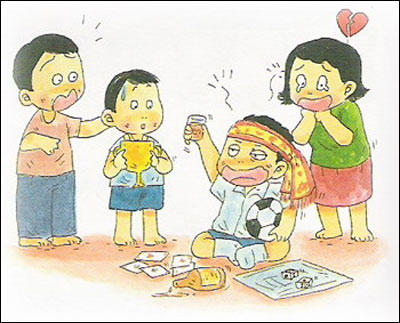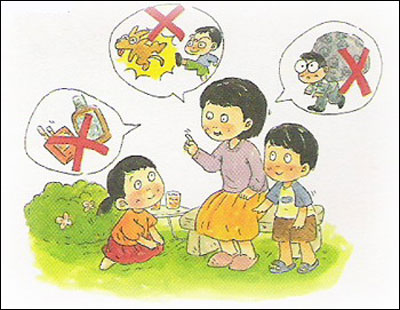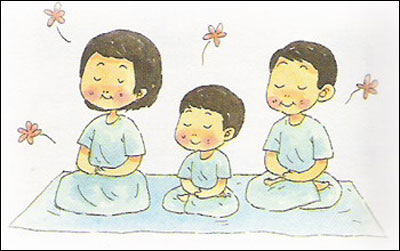Making the Five Precepts Easy
for Children to Understand
One shall not consume intoxicants.
Once, I had the chance to observe a senior monk simplify the Five Precepts for the children. The writer was impressed with the method and would like to pass on this information to parents as a guideline. It was taught in the form of dialogue between the teacher and the children:
The Origin of the Five Precepts
Today, I, as a senior monk, am going to teach you a fundamental and very important aspect of our lives: the five Precepts.
Nobody knows the origins of the Five Precepts. They existed even before the birth of the Lord Buddha, and He advised that everybody should abide by them.
Do you know what the Five Precepts are?
1. One shall not kill.
2. One shall not steal.
3. One shall not commit adultery.
4. One shall not lie.
5. One shall not consume intoxicants.
I will explain to you how the Five Precepts came into existence. Hopefully when you grow up and begin to get angry at either small or large issues, this knowledge can help you control your temper.
How did the First Precept, one shall not kill, come into existence?
The senior monk: Whom do you love the most?
The children: My mother and father, sir.
The senior monk: Is there anybody you love more than your parents?
The children: Yes, myself, sir.
The senior monk: Yes, that’s correct, everybody loves oneself the most. What about fowl? Do they love themselves?
The children: Yes, sir.
The senior monk: Are you sure?
The children: yes, sir.
The senior monk: How can you be sure? Did they tell you that?
The children: No, they didn’t.
The senior monk: Then how do you know they love their lives?
The children: When someone chases them, they run for their lives.
The senior monk : Yes, animals are the same as us. When someone threatens them, they will run for their dear lives. Although they cannot say it, we can tell. But what about other animals, such as pigs and cats, do they love their lives?
The children: Yes sir.
The senior monk: We love our lives, as do the animals, be it birds, or pigs, or cats. There is no one and no animal that does not love his life. Recognizing this fact is how the First Precept originated, that nobody should take life away from another creature, not even those of animals.
I will explain to you how the Five Precepts came into existence.
How did the Second Precept, one shall not steal, come into existence?
The senior monk: Now I want you to think about what we need to live.
The children: Air, food, and water, sir, as well as medicine, clothing, and a house. We also need money to live.
The senor monk: You are right. Although all of you are in school, your parents have to provide you with
1. Clothing.
2. Food.
3. Shelter.
4. Medicine.
In Buddhist terminology, these are called the Four Basic Necessities, which every human being needs.
On top of these, we have furniture, shoes and so on which we need to make life comfortable. If somebody takes these things away from us, can we survive?
The children: No, we can’t.
The senior mink: That’s correct. They don’t have to kill us, but if they steal or take away these things from us, then we can’t survive either. That is how the Second Precept came into existence; it is because we need these possessions to survive.
How did the Third Precept, one shall not commit adultery, come into existence?
If other people do not take our lives or our possessions, we should live a happy life. However, if they take what we love most, which are our husbands, our wives, and our sons and daughters, we will suffer great sadness. This is the idea behind the Third Precept, that no one should take away a loved one from somebody else, and therefore one shall not commit adultery.
How did the Fourth Precept, one shall not lie, come into existence?
Think of all the people you love, your parents, your friends, your brothers and sisters, and your teacher, and imagine if you find out that they are not honest with you. Your reaction would be that you will not love them any longer.
The senior monk: Do you have a brother?
The children: Yes, I do.
The senior monk: if you found out that he lied to you, would you be mad at him?
The children: Yes, I would.
The senior monk: And if you lie to him, do you think he will be mad at you?
The children: Yes, he will.
The senior monk: And have you ever lied to him?
The children: Yes, I have.
The senior monk: Remember this, if you lie to somebody, they will feel less love for you each time, and vice versa. No one likes dishonesty, so you should not lie to anyone. This is how the Fourth Precept came into existence.
The accomplishment we can feel most proud of is to raise our children to be ethical adults.
How did the Fifth Precept, one shall not consume intoxicants, come into existence?
The Lord Buddha gave us these lines of reasoning to contemplate.
1. Those that do not kill living creatures, be they small or large animals, or other human beings, have already earned the notable merit of giving security to all lives.
2. Those who do not steal have already earned the notable merit of giving security to property.
3. Those who do not commit adultery have already earned the notable merit of providing security to their spouses.
4. And those who do not lie have already earned the notable merit of giving sincerity.
So when we are able to abide by the first Four Precepts, we are earning significant merit of four different kinds. But when it comes to the Fifth Precepts, all of you will need to pay more attention to understand the logic behind it.
When a person does not take life, steal, commit adultery, or lie, must have the conscience to refrain from that behavior. Without his character, this person will not be able to avoid committing those sins.
Our conscience can be very strong, but unfortunately, it can also be enfeebled. For example, a student will have an examination the following day; suddenly, he is overwhelmed with fever. He takes some medicine and feels a little bit better. He is able to bring himself to finish all the lessons needed for the exam. His conscience is strong.
However, within the same person, the unyielding conscience can crumble into dust as soon as he consumes intoxicant such as spirits, beer, amphetamines, and so on. Since the intoxicants can wreck our conscience and lead us to commit sin, we need the Fifth Precept to keep our conscience and our dedication to the other Four Precepts intact.
Let me give you an example: there is a boy about your age whose father, when drunk, is capable of killing the chickens or ducks on their farm. Sometimes, he will spank his son and use profanity. But when he is sober, he is a very good father. So, I want you to remember this, when you grow up, do not drink alcohol or use drugs.
How do you keep the Five Precepts intact?
When I was a student, I started training myself to observe the Five Precepts. This is how I did it.
Before I was ordained, I wore a Buddha image around my neck. Every morning before going to school, I would hold the Buddha image in my hands and pay my respects by chanting:
“Name tussah bhakavato arahato summa sumbuddhassa” three times.
And then I would make my resolve with the Buddha image:
1. Today I will not kill.
2. Today I will not steal.
3. Today I will not commit adultery.
4. Today I will not lie.
5. Today I will not drink alcohol or use drugs.
Once I had done this, then I would leave for school. When I started, sometimes I was able to keep the five Precepts for the day, but sometimes I couldn’t. However, after half a year, I was able to keep all Five Precepts everyday. After I was able to abide by the Five Precepts for six years straight, then l was ordained. Do you think you can do it too? I think you can.
Conclusion
Let me go over the Five Precepts one more time with you.
Why should we not kill? Because everybody loves his life.
Why should we not steal? Because everybody needs possessions to be comfortable. If certain things were taken away from us, we will not be able to survive. Even if we survive, our lives will be full of hardship.
Why should we not commit adultery? Because everybody loves their family and friends.
Why should we not lie? Because every body loves honesty and truthfulness.
Why should we not consume intoxicants? Because it will destroy our conscience. Without our conscience, we would be capable of infringing upon all the other Four Precepts. Therefore, if you want to grow up to good person, you have to abide by the five Precepts.
The writer hopes that this account will help parents to teach their children to observe the Five Precepts, so that they grow up to be good people. The accomplishment we can feel most proud of is to raise our children to be ethical adults.
Meditation - Related Articles
" />
" />
" />
" />
" />
" />
" />
" />
" />
" />
" />
" />








